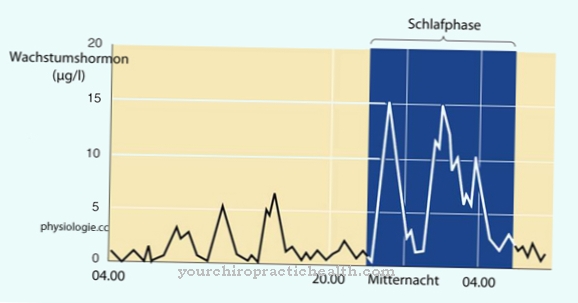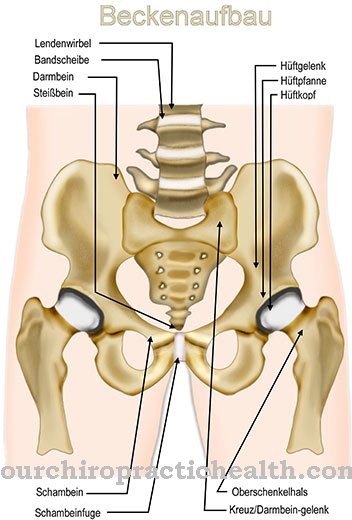In the Depersonalization the patient experiences his or her own person or parts of the self as alien. The cause is so far controversial.
What is depersonalization?

© Punkbarby - stock.adobe.com
The term depersonalization comes from psychology and was coined in the 19th century by Krishaber and Dugas. Patients with this perception disorder suffer from alienated self-perception. Often the depersonalization overlaps with the derealization, in which the patient perceives his environment as alienated and unreal. Both the body and your own personality, perception, memories or your own thought processes and emotions can feel strange or not belonging in the context of depersonalization.
The same can apply to one's own statements or actions. If such an alienated perception of one's own person and environment persists, then we are talking about a mental disorder. According to ICD-10, depersonalization is one of the neurotic forms. The DSM speaks of a dissociative disorder. The prevalence of depersonalization experiences is officially given as 1: 200,000 and makes the disease a rare phenomenon. Studies suggest a significantly higher prevalence.
The considerable number of unreported cases is probably due to misdiagnoses such as temporal lobe epilepsy. The scientific background of depersonalization has been controversial so far. In the secondary form, the disorder can accompany physiological and mental illnesses such as post-traumatic stress disorder.
In its primary form it occurs in stressful or life-threatening situations and in this case does not necessarily have to be pathological, depending on the duration of the condition. The same is true of momentary depersonalization during spiritual experiences or under the influence of medication and drugs.
causes
The exact cause of the depersonalization is explained by different models. Neurophysiological theories rely on the patterns of neural representation and the mirror neurons, which react to observing actions in the same way as they do to execution. Own behavior is also presented neural. Depersonalization and derealization can therefore be based on deviations in the mirror neuron systems.
Neurochemical theories assume that the neurotransmitter systems are involved, which bring neuronal information flows out of balance and are already involved in stress reactions. Other theories see the cause in the serotonergic system and thus in an excessive serotonin level or agonist level of the central nervous messenger substances. The glutamatergic system was also assumed to be the cause, because glutamatergic substances appear as NMDA antagonists and can cause reduced activity in the limbic system.
There are also causal theories on dysregulation of the opioid system. Psychotraumatology sees depersonalization as a reaction to traumatic experiences. By restricting certain brain activities, the body is better able to react to dangerous situations. In depth psychology, depersonalization is a protective defense reaction to unbearable feelings, thoughts and states by leaving one's own person. Cognitive psychological approaches see mental information processing as the cause.
You can find your medication here
➔ Medicines to calm down and strengthen nervesSymptoms, ailments & signs
Depersonalization manifests itself in an enormously diverse range of symptoms. Emotional numbness is one of the leading symptoms. Patients feel an inability to feel or an unreality of their own emotions. They no longer touch people and objects. The body experience is often affected by changed perceptions, for example as lifeless or strange. Just as often the voice or one's own reflection appear strange. Many patients tell of perceiving themselves and their environment from a different perspective, for example from the ceiling of the room.
Some also see themselves as if they were on a screen or simply stand next to themselves. Own movements and mental processes feel like a robot. They are not preceded by a willful decision; they feel like remote-controlled. Memories have a remote effect, even though they have only passed back hours. So the sense of time changes. In addition to these key symptoms, auditory and tactile perceptions can appear strange. Empty thoughts, an increase in the pain threshold or derealization can also occur.
With derealization, the things in the environment appear changed and often as in a dream or distorting mirror.The patients find the alienation experiences unsettling and often fear losing their mind or actually being in a dream or a coma. Despite the changed perception, there are no delusions. So the reality check remains intact. The same applies to the assessment of tasks, oneself or the environment.
Only the people's subjective view of themselves and the environment changes in perception, but the perception of the object's character is retained. Even though people experience other people like hallucinations, for example, they still know that they are real people.
diagnosis
The diagnosis of depersonalization is made according to ICD-10. Only prolonged depersonalization is of disease value. In terms of differential diagnosis, the phenomenon is to be assessed as a purely psychological or neuropsychiatric phenomenon and also to be distinguished from other psychological diseases.
Complications
As a rule, depersonalization leads to severe mental disorders that must be treated by a psychologist in any case. Without treatment, thoughts of suicide and eventually suicide can occur. Those affected can no longer correctly perceive or assign certain people or objects from their environment. This leads to upset, fear and panic.
Most patients feel emotionally numb. Feelings can no longer be perceived. This is especially negative for other people and can lead to the termination of friendships or social conflicts. Likewise, physical pain only triggers few emotions.
The patient's visual perception is also disturbed and severely restricted. The patient feels listless and weak. Often those affected withdraw strongly. Movements are also only possible with difficulty, it is no longer possible to feel fun and joy.
Treatment usually takes place through discussions with a psychologist. These can be supported with the help of medication, although it cannot be predicted whether the treatment can really combat the depersonalization. It often takes several months for the psychologist to find the cause of the depersonalization and treat it in a targeted manner.
When should you go to the doctor?
If you have slow or sudden changes in your personality, you should see a doctor. In many cases, the mental disorder makes it impossible for the person affected to perceive the changes sufficiently and to seek help. In these situations, the support of people close to you is of immense importance. As soon as the person concerned experiences his own life like in a movie, he needs medical care.
A lack of emotion in events in his own life is considered worrying. If sensations and inner perceptions can no longer be described or experienced, a doctor must be consulted. Changes in your own personality should be carefully observed and discussed with a doctor. As soon as the consciousness of the person concerned changes, indifference is noticeable or feelings can no longer be shown, a doctor must be consulted.
A doctor's visit is also necessary if the memory or thinking changes in an unusual way. Changes of opinion or further development processes in the course of one's own life must be distinguished from this. As soon as the person concerned begins to suffer from the changes that are taking place, they need a doctor. If he experiences himself as foreign or as not belonging to his body and his own thoughts, there is cause for concern.
Doctors & therapists in your area
Treatment & Therapy
With secondary depersonalization, the underlying disease is treated. Primary depersonalization can be approached in a number of ways. There is no generally applicable or established therapy. Glutamate modulators such as lamotrigine can be used as pharmacotherapy for treatment. The same goes for opioid antagonists like naloxone or selective serotonin reuptake inhibitors like fluoxetine. The administration of selective serotonin norepinephrine reuptake inhibitors such as venlafaxine also resulted in improvement in individual cases.
The administration of tricyclic antidepressants clomipramine is also possible. Neuroleptics such as aripiprazole and stimulants such as Ritalin have proven to be just as promising in individual cases. There are also various options for psychotherapeutic therapy for depersonalization. The depth psychology pursues a psychoanalytical approach to the resolution of the actual conflict from which the patient wants to escape through the depersonalization. Cognitive behavioral therapies focus on fear.
They let patients reevaluate their experiences of depersonalization, ideally without fear. Another treatment option is neuromodulation via electroconvulsive therapy or transcranial magnetic stimulation. According to studies, electroconvulsive therapy has worsened depersonalization as often as it eliminated it. Studies have shown that transcranial magnetic stimulation on the right prefrontal cortex has shown positive effects. Stimulation of the temporoparietal transition cortex on the right side also resulted in relief.
Outlook & forecast
The prognosis of depersonalization depends on the intensity of the disease and the age of the patient when it first appeared. The younger the affected person is when the diagnosis is made, the less favorable the prognosis. Often the patients suffer from the disease for many years or decades.
The prospect of a quick recovery is given if the depersonalization is mild. Normally, spontaneous healing and permanent freedom from symptoms occurs within a few days. Medical treatment is not necessary for these patients, as the symptoms are in a natural remission.
A strong expression of the symptoms of the disease is difficult to treat. The prospect of a cure is basically possible, but it includes a long period of regular medical care. It usually takes several years of therapy to improve the symptoms. In psychotherapy, patients gradually learn how to deal with the disease in everyday life and can use this to improve their wellbeing.
Conditions of psychological stress intensify the existing symptoms and have an immense influence on the healing process. The prognosis worsens with stress and persistent emotional tension. Once the psyche is stabilized, the signs of depersonalization decrease.
You can find your medication here
➔ Medicines to calm down and strengthen nervesprevention
As the causes of depersonalization are controversial, there are no recognized preventive measures to date.
Aftercare
Direct follow-up after depersonalization is very difficult in most cases and cannot be carried out according to a clear scheme. Those affected must receive regular care even after the disease has healed and should also consult a psychologist after treatment in order to avoid the recurrence of depersonalization. In some cases it makes sense to continue taking medication in order to contain the causes of the depersonalization and to treat the disease permanently.
Whether a complete cure is possible at all cannot generally be predicted. As a rule, contact with people has a very positive effect on depersonalization and can prevent it. Therefore, those affected should keep in close contact with friends and family.
In difficult life situations, these people can offer help to those affected. Contact with other people affected by depersonalization can also have a positive effect on the course of the disease and possibly also lead to possible solutions. Stress and constant physical tension should be avoided as these factors promote depersonalization. Likewise, a sufficient intake of fluids and a healthy diet can alleviate depersonalization and improve the patient's quality of life.
You can do that yourself
Anyone who perceives themselves and their body as unreal and often has the feeling of standing next to them should follow a few tips in everyday life. In addition to treatment by a psychologist or psychiatrist, the self-help tips can improve the quality of life in everyday life and make life easier for those affected.
Since those affected by a depersonalization disorder often have a distorted perception of their own body, physical activity usually has a positive effect on the patient's body and mind. With endurance sports such as jogging, cycling or swimming, those affected can feel better and feel more alive again.
Even with yoga, those affected can better ground themselves in the midst of all the excitement and remain in balance. A balanced diet is extremely important with a depersonalition disorder and can have a positive effect on the clinical picture. A healthy diet provides the body with all the nutrients it needs to function properly.
Consuming enough water or other beverages is also important in order to recharge your batteries and to be able to stay in your midst. The organism gains energy and vitality through a constant supply of fluids. Those who start their day with a hearty breakfast can recharge their batteries in order to successfully cope with everyday life with a good body feeling.



.jpg)
.jpg)























